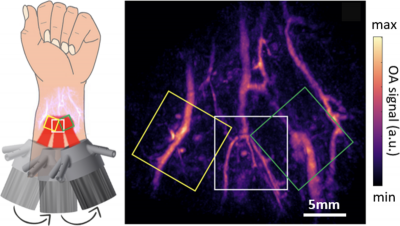Development Of An FPGA-Based Optoacoustic Image Reconstruction Platform for Clinical Applications
From iis-projects
Contents
Short Description
Optoacoustic (OA) imaging is a hybrid imaging method that enables deep tissue imaging with a high spatial resolution by combining optical illumination with ultrasound detection. OA imaging is based on the OA effect, where the ultrasound (US) waves are generated when incident laser energy is absorbed by different molecules leading to local temperature rise. The acoustic pressure propagating from the molecules is acquired using various ultrasonic transducers. Finally, with the help of different reconstruction algorithms, the initial pressure distribution from the acquired pressure waves is recovered. In practice, most of these reconstructions are carried out on workstations making OA imaging systems bulkier and more complex. Hence realizing OA image reconstruction on FPGAs will enhance the adaptability of OA imaging systems with point-of-care (bedside) applications due to their small size and high computation power.
With our MATLAB and C++-based delay and sum-based image reconstruction algorithms, we can successfully reconstruct OA images from pre-acquired raw OA signals. We are currently working on the implementation of FPGA based delay and sum-based image reconstruction algorithm with pre-acquired raw OA signals using high-level synthesis (HLS). Your task includes devising a parallel HW accelerator and exploring different HLS code optimizations to achieve the best performance. The algorithms will be tested on an existing FZ3 Card, a powerful deep-learning accelerator card based on Xilinx Zynq UltraScale+ ZU3EG MPSoC. The overall goal will be to streamline the raw OA data and perform accelerated image reconstruction on the FPGA in real-time.
Goal & Tasks
- Devise a parallel HW accelerator for OA image reconstruction.
- Explore different HLS code optimizations to achieve the best performance.
- Test the algorithms on an existing FZ3 Card.
- Streamline the raw OA data and perform accelerated image reconstruction on the FPGA in real-time.
Prerequisites
- FPGA Programming (VLSI 1 course or similar)
- C++ Programming
- MATLAB or Python for evaluation of results
- Image processing algorithms (beneficial)
- Knowledge of Linux (beneficial)
Status: Available
Looking for semester and master students
- Supervision: Federico Villani, Dr. Cagla Özsoy, Andrea Cossettini
Character
- 10% Literature study
- 20% Algorithm evaluation
- 30% Firmware design and optimization
- 30% Measurements and validation
- 10% Documentation
